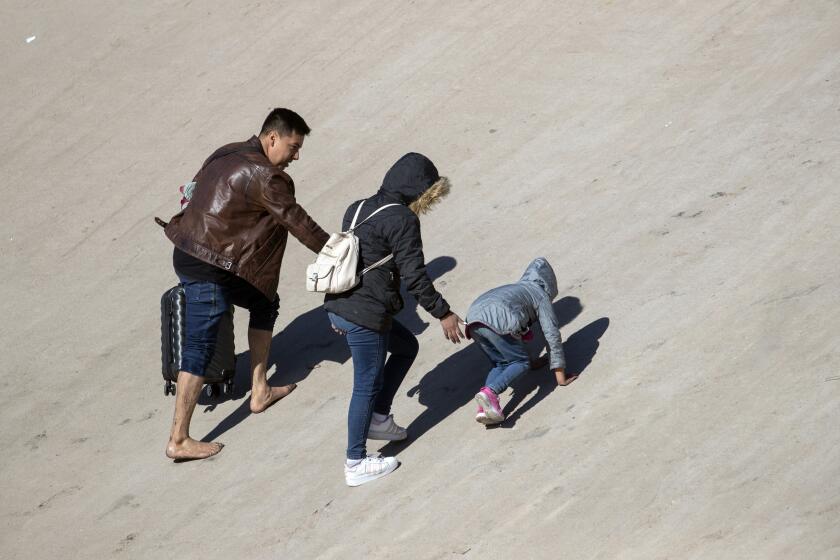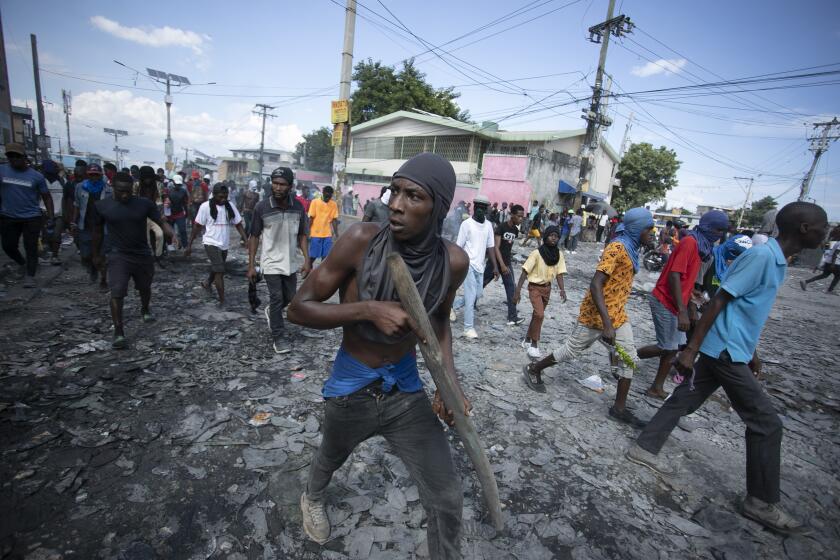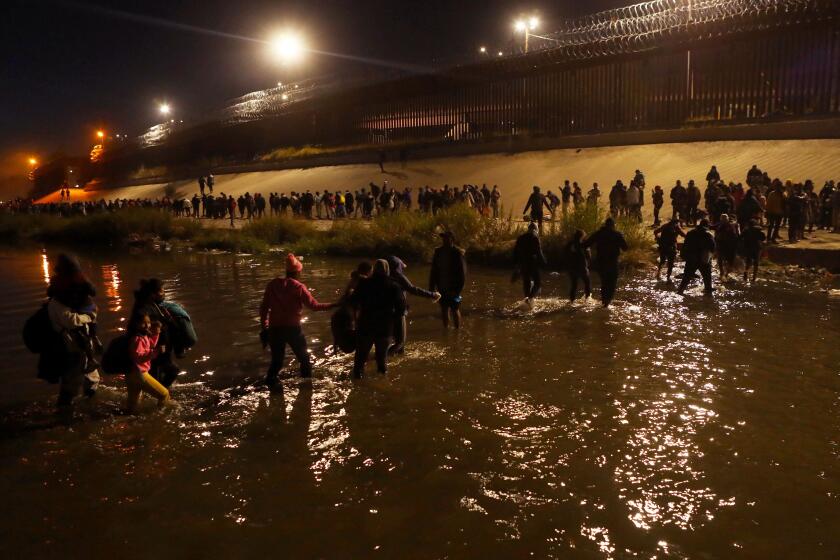Haitians rush to secure passports in hopes of finding a legal path to U.S.

Haitians in Port-au-Prince rush to get a passport, hoping they will be chosen to live legally in the U.S. under President Biden’s immigration plan.
- Share via
PORT-AU-PRINCE, Haiti — Hundreds of Haitians are flocking daily to the sole immigration office in Port-au-Prince, pressing against the bright blue gate as they strain to hear whether their name is called, hoping they will soon be chosen to live legally in the U.S. under a new immigration plan.
The crowd has swelled ever since President Biden announced that the U.S. will accept 30,000 people a month from Haiti, Nicaragua, Cuba and Venezuela. Those selected will be entitled to work for two years if they have eligible sponsors and pass background checks.
Those selected also will need a passport to travel, prompting the daily rush at the immigration office in Haiti’s capital.
“I’m here to leave Haiti, but I don’t want to risk my life via a boat,” said Jennyfer Leonard, a 30-year-old teacher, referring to how dozens of Haitian migrants smuggled aboard boats have died in recent attempts to reach the U.S.
“It would be nice to leave with my two kids for them to have a future, but I’m not willing to take the risk of them dying along the way,” she said.
The plan calls for expelling more migrants without considering their asylum claims; expanding avenues for Nicaraguans, Haitians and Cubans to enter.
So like hundreds of other Haitians in recent days, she opted for the recently announced legal route to the U.S. instead of joining the tens of thousands of Haitians who have been intercepted at the U.S.-Mexico border and deported.
On Wednesday, a crowd gathered at the immigration office under a brutal sun to apply for a passport, pick one up, renew an existing one or check on the status of an application.
“Is that my name? Is that my name?” people shouted every time a government official approached the gate and called on someone.
Garry Saint Paul, 25, was among those waiting to pick up his passport.
He previously worked in the neighboring Dominican Republic as a janitor at a hotel until his contract and passport expired, forcing him back to Haiti, where he remains unemployed.
“Haiti is under siege,” he said. “Gangs are taking over. Why not leave if you get the opportunity?”
Haitian refugees share stories about what happened when they reached the end of their perilous journey and made it to the U.S. border.
Gangs control an estimated 60% of Port-au-Prince, having grown more powerful and violent since President Jovenel Moise was assassinated at his private residence in July 2021. Reported kidnappings soared to more than 1,200 last year, double from the previous year, and 280 killings were reported in November, a monthly record, according to the United Nations.
“Life is really difficult,” said Leonard, the teacher, whose brother is a truck driver in Philadelphia and has agreed to be her financial sponsor.
Violence also is a big concern for Salomon Jean-Pierre, a 22-year-old accounting student who stood in line near Leonard.
“The only thing Haiti promises you is death,” he said.
Jean-Pierre doesn’t have a financial sponsor yet, but he contacted his aunt in Atlanta, who said she would talk to his cousin there and see if he could help.
Haiti hasn’t held legislative elections since 2019. The last 10 senators’ terms expired overnight, leaving the House and Senate empty amid a spiraling crisis.
“I am going to get my paperwork ready just in case,” Jean-Pierre said. “I’m hoping for the best, that Haiti will change, but I don’t see a future. ... If this works out for me, Atlanta, here I come!”
Poverty and hunger are deepening across Haiti, a country of more than 11 million people where more than 60% earn less than $2 a day. Inflation has ballooned into double digits while Haiti grows more politically unstable. Its last democratically elected institution — the Senate — expired Tuesday with the terms of the final remaining lawmakers. Promises to hold legislative and general elections have yet to materialize amid concerns over growing violence.
Given the worsening situation, Saint Paul is hoping his brother-in-law in Texas will financially sponsor him for two years. He then plans to remain in the U.S. after his stay expires.
“There’s no way I’m coming back,” he said, adding that he expects the U.S. to renew or extend the humanitarian parole plan. “I know that immigrants are the ones who built America. America is always going to need immigrants.”
As President Biden visits El Paso, thousands of people who fled oppressive countries are marooned in Mexico in the wake of his expansion of a Trump-era policy.
More to Read
Sign up for Essential California
The most important California stories and recommendations in your inbox every morning.
You may occasionally receive promotional content from the Los Angeles Times.














